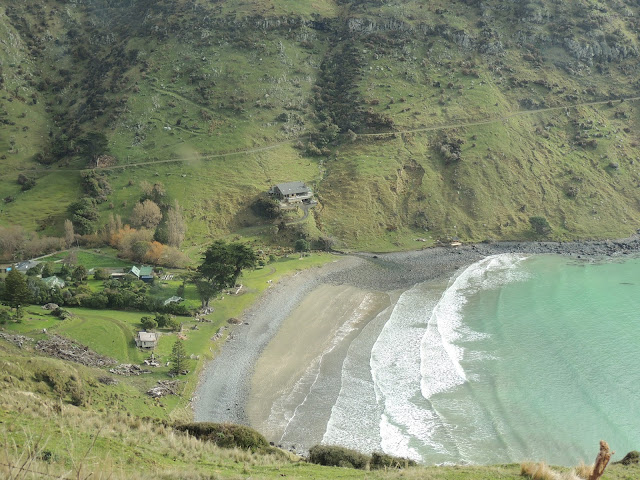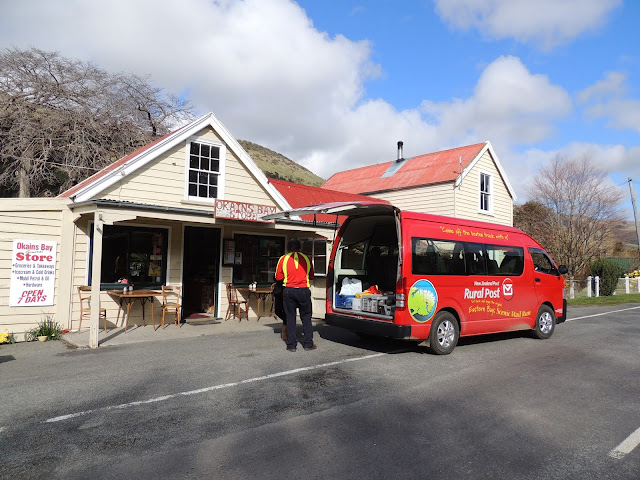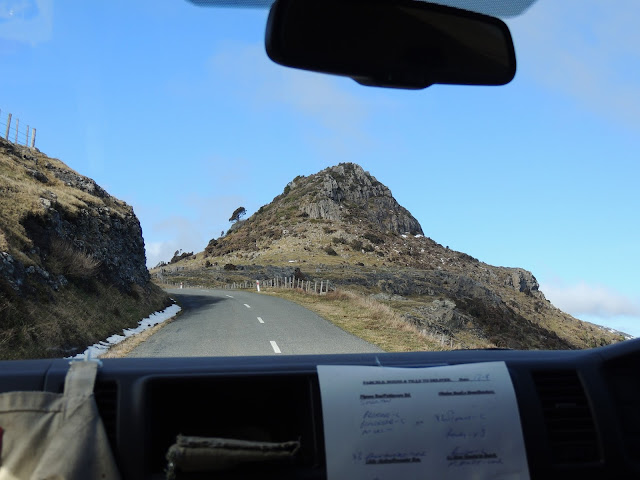T'was a gorgeous day Thursday when we boarded at 9 am near the Akaroa war memorial.
Postie (NZ for mailman) Robin was born to do this: both delivering the mail to tiny hamlets throughout the peninsula, chatting with people who came down to greet the mail truck, but also answering endless questions from the lone two passengers on today's run.
Robin organizes the day's mail
The landscapes were breathtaking. And we learned a lot. Including that there's no letter "L" sound in Maori, that giant cruise ships don't clutter up Akaroa Bay because the water's only 15 meters deep, and that he and his family shop for food in Christchurch.
Map of our route in black.
The rural post is government-owned and Robin contracts with the firm that the government contracts with. He also does a school bus run in his van, ferrying kids to school and home from Akaroa and other communities. This scenic mail run is part of his postal gig.
Today's ride opened our eyes to the many small communities on the peninsula, total population 2000 east of Little River.
Mailbox after mailbox, many with personality.
Pigeon Bay
Starvation Gully Road
The post boxes are outside Pigeon Bay School, now shuttered. This bad boy watched us from next door.
We used the toilet in the school, which smelled just like you'd expect a closed school to smell, of dust and wood and silenced chatter.
The gymnasium, with a sprung dancefloor.
Robin makes this run six days per week, 300 days a year. He's also a dedicated conservationist, looking after and regenerating a large swath of land (now a conservation trust) denuded of trees over the decades.
Satellite view of Bank Peninsula.
Mosaic of Robin's bus made by a friend, in part using his family's dishes shattered in the February 2011 Christchurch earthquakes. Robin told us there were 14,000 aftershocks. Discussing the earthquake with anyone who experienced it (and they did, here on the peninsula where he lives, just an hour from the city) immediately pulls a shroud over conversation. It's a somber, serious recollection.
Emergency: incredible view out the van's emergency door
I wish I could show you every place we stopped and relate all the conversations Robin had with the people he serves. Clearly, this widespread community is just that. Closely knit, with news carried in the postie's van both way. "There's a sleeping leopard seal on the beach," one woman relayed. "Best keep the dog away," he responded. With another, Robin discussed an upcoming meeting of the LeBons Bay Environmental Educational Trust, an effort to turn a closed school in his community into a place where city kids can come to be outside, hear birds, race around, and learn about nature.
Decanter Bay
Sometimes we were up so high looking down it felt like we were flying.
Enormous landscape, much grazing. Some of these farms have been in families for 165 years. Robin told us the government owns just 2% to 3% of the Bank Peninsula.
What's this? Shy spring lambkins?
We drove and drove, sometimes frighteningly close to the edge.
Often down quiet lanes that seemed like scenes from a distant past.
And then it was time for tea. What? Yes, along the way Robin serves a charming and delicious tea made by his wife, who was that day having a "stitch and bitch" meet with some friends at the house of a woman who had broken her hip. Naturally, they were cooking and tidying up for her too. We dropped off her mail too.
Coffee, tea, cheese, crackers, and homemade muffins and chutneys. To me, this epitomizes the hospitality of NZ.
Next stop, St Luke's Anglican Church in Little Akaloa
Surprisingly, Robin encouraged us to get out and briefly explore these extraordinary places.
Built and carved by John Menzies, for whom Menzies Bay is named.
This 1906 stone building replaced the 1874 church which had been a school. Chief benefactor John Menzies, a lay reader, not only donated much of the money, he did much of the construction and decorative work.
Menzies' designs, using Maori motifs, are a talking point with all who pause for reflection at St Lukes.
Near Little Akaloa is Menzies Bay. It is characteristic of this area that a few family names occur over and over, reflecting the family nature of a district with which communication was once difficult. Menzies, Craws, Waghorns and Boleyns are still represented here.
The bell pull.
Churchyard cemetery.
Chorlton Post Office
This little guy is third generation on his family's farm.
On we drove, and if the views hadn't been so compelling I'd have taken better notes and could tell you which bays these are, with soaring views of the Pacific.
Here's the oldest and longest continually operating store in NZ. Since 1873 it's been open, today in a community of 140.
With 12 children in attendance at the school
There are four million people in NZ, one million of them on the South Island.
This is where Robin has lived and raised his family for 30 years.
Hooray. Another walkabout.
Remember the woman telling him about the leopard seal? Here she is, a long way from Antarctica. They are vicious, according to Robin, who guided us to within a safe distance for zooming in ("don't get between the water and her"). Why she's here we'll never know.
The leopard seal is second only to the killer whale among Antarctica's top predators. Its canine teeth are 2.5 cm (1 in).[19] It feeds on a wide variety of creatures. Smaller seals probably eat mostly krill, but also squid and fish. Larger leopard seals probably switch from krill to more substantial prey, including king, adelie, rockhopper, gentoo, emperor, and chinstrap penguins, and less frequently, other seals, such as crabeater seal. Leopard seals have been filmed eating fur seal pups.[20]
One more locked post box shed, this one at Gough's Bay, before we take a shortcut back to Akaroa.
An extraordinary day, riding the back roads of the Banks Peninsula. Robin was interviewed for a NZ program called This Town, and here's the episode, though not sure one can watch without paying/belonging.

























































Fascinating *post* there... Seems to me that it summed up a good portion of your trip right there; marvelous scenery, local history, food, and meeting new, hospitable folks. Great stuff! -bahns
ReplyDeleteGood summary, bahns. And it does describes the trip in microcosm.
ReplyDelete